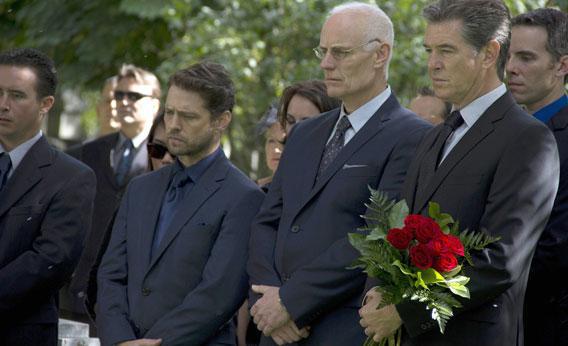Stephen King’s Bag of Bones (A&E, Sunday and Monday at 9 p.m. ET) is a four-hour miniseries adapted from a 1998 horror novel. Like The Shining, it concerns a blocked writer. Like Pet Sematary, it relies heavily on dream sequences. Like Cujo, it’s a dog.
Pierce Brosnan lends his senatorial hair and his dashing cragginess to hero Mike Noonan. The character is a novelist published by Scribner (King’s own publisher) and said to be in the same league, commercially, as James Patterson, John Grisham, and Richard Bachman (King’s own occasional pseudonym). As the proceedings get underway, Mike is finishing up his latest blockbuster, and he summons his wife, Jo (Annabeth Gish), into the den so that he can dictate its last sentence to her. “Why do you always have me write the last line of your books?” Jo asks adoringly. “Because … I couldn’t write them without you,” says he, uxoriously. “Are you just trying to get laid?” she wonders. Yes, he is, and they proceed to smoosh their attractively lined faces together in a moment of Cialis-ad foreplay.
Months pass. At a book signing, the camera snakes past a line of autograph-seekers in a tracking shot establishing Noonan’s glamour. Jo sits beside him at the signing table where, in reality, a vice president of publicity would be protectively crouched. But fidelity to the truths of the publishing business would interfere with the narrative. In fact, Bag of Bones is particular about noting that a mere four months pass between the typing of the last line and the moment where Jo ducks out of the bookstore event to visit the feminine-care aisle of the drugstore across the street. On the way back, she gets fatally hit by a bus. The motion slows. The soundtrack succumbs to the pulse of heartbeat. Brosnan races to her body howling like an animal, sensibly launching himself into a mood of grand kitsch. The camera pulls in on Jo’s drugstore purchase, a home-pregnancy test. In the scheme of things, the pink of the unopened box is a positive.
There is a funeral. Noonan’s agent wants him to get back on book tour. (Bag of Bones pays literary agents the backhanded compliment of confusing them with the Hollywood kind. The rep, played by Jason Priestley, motors through the movie in a convertible his face full of stubble and his mouth full of an oily conversational substitute.) But Noonan wants to grieve floridly. The first stage is denial. The second and third are cliché. The widower replays and replays his wife’s outgoing voicemail message. He sobs at a slide show of snapshots on his iPad thingy. The set dresser scatters some dishes and some laundry around, which is meant to indicate despair but simply suggests bachelor living. Noonan tries to get some work done but finds himself terribly blocked. He turns to the bottle and uncorks his frustration. I can tell you from experience that it does not do much good, when you’re trying to write, to take three slugs of whiskey and bark the following to Microsoft Word: “Something! Come on! Just give it to me! Something!” It helps to be less drunk and more polite.
Attempting to get away from it all, Noonan heads off to Dark Score Lake, where he starts suffering triple-decker erotic nightmares and receiving communiques from beyond the grave as the film loses what little sense of subtlety it had. The family cabin that had been Jo’s little getaway is haunted by the ghost of a blues singer (Anika Noni Rose) who played the local fair in 1939. The attractive young widow (Melissa George) with whom the hero dallies is embroiled in a custody dispute with her daughter’s paternal grandfather (William Schallert), who owns the town. And Noonan, who’d been convinced he was infertile, investigates whether Jo was sleeping around. The only thing giving these tangled plotlines a sense of unity is a concern with parenthood. “Sometimes I feel like a motherless child,” the blueswoman sings in an ominous warble. In its sober moments, Bag of Bones attempts to say something about care-giving and leave-taking.
But, much of the time, it doesn’t especially care what that something is, because it’s busy trying to scare the pants off you and failing in the attempt. The show telegraphs its frights. A combination of hokey staging and infelicitous editing keeps you guessing, always correctly, about when the rubbery ghouls will be springing out. Indeed, the meagerness of the special effects ushers the series into the territory of low camp—a region perhaps controlled, like Dark Score Lake, by Schallert’s character, whose every breath is a cackle and whose henchwoman (Deborah Grover) is a vision of theatrical malice in black Victorian garb. At points, Bag of Bones plays less like a horror story than a fond parody of one.
“Jo brought me here … for a reason,” Noonan muses at one point. “Maybe it’s to get you to write again,” supposes his love interest. Maybe. It is sometimes said that writer’s block is nothing more than anxiety about writing badly. We must applaud the adaptors of Bags of Bones for refusing to succumb to that fear.
